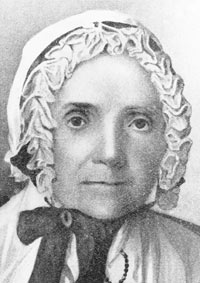Lucy Mack Smith
Lucy Mack Smith was the mother of Joseph Smith, Jr. She is noted for writing the memoir: Biographical Sketches of Joseph Smith, the Prophet, and His Progenitors for Many Generations. (A new edition has been compiled, recapturing the emotional import of Lucy's original writings, which were severely edited in the 1853 version: The Revised and Enhanced History of Joseph Smith by His Mother, edited by Scot Facer Proctor and Maurine Jensen Proctor.) Lucy Mack Smith was a great and important leader of the gospel restoration movement during Joseph's life.
Lucy Mack was born on July 8, 1775, in Gilsum, New Hampshire, the youngest of eight children born to Solomon Mack and Lydia Gates Mack. Lucy Mack's family was religious and even evangelical. Her older brother Jason eventually formed his own religious community, and her two sisters both had spiritual experiences giving them confirmation that their sins were forgiven and that they should call others to repentance. Lucy's father, after a bout of serious illness, experienced his own profound religious conversion, while her mother was ever a spiritual and moral leader in their home. [1] Lucy Mack was born into a changing social atmosphere. Mothers had gained more importance in the home for rearing and training their children, and watching over their intellectual, moral, and religious development. At the same time, the social landscape was becoming more various, so that choices in the home could be more individual in relation to the leaning of the community. Meanwhile, both secular and religious writers were extolling the influence and power of women over the moral direction of society.
Lucy married Joseph Smith, Sr. in January of 1796. She brought with her a reasonable dowry provided by her brother Stephen and his business partner, plus the good moral example of her parents, and a solid grounding in religious faith. Her combined strength and spirituality made her perfect to be the matron of the religious movement that would be called Mormonism.
Alvin and Hyrum were born into the family, and in 1802, Joseph Smith, Sr. located his family in Tunbridge, Vermont, where he opened a store. After about six years of marriage, Lucy became seriously ill. Death seemed certain. Her sisters had succumbed to the same disease, which the doctors called, "confirmed consumption." Lucy did not feel ready for death and judgment. She recounts: "I knew not the ways of Christ, besides there appeared to be a dark and lonesome chasm between myself and the Saviour, which I dared not attempt to cross" (Proctor, ed., p. 47). Near death, having visions of heaven, Lucy covenanted with God that if He would let her live to serve her husband and children, she would "endeavor to get that religion that would enable me to serve him right, whether it was in the Bible or wherever it might be found, even if it was to be obtained from heaven by prayer and faith" (Proctor, ed., p. 48). She heard the voice of Christ ratifying the covenant and encouraging her to believe in Him. From that moment, she began to recover. When her strength was regained, she began the quest to find religious instruction. Yet, she was disappointed again and again, even when witnessing sermons from pastors noted for their piety. After several years of searching, Lucy thought it might be easier to obtain spiritual peace, if she were baptized. She found a minister willing to baptize her, but into no particular church. She continued this way for over a decade.
Lucy's husband, Joseph, Sr., fell prey to dishonest businessmen and faced mounting debt. A series of financial setbacks forced him to move his family several times; their lack of money forced everyone in the family to seek for employment for the family's support; the lack of funds limited access to education for the children, placing even more responsibility on Lucy to educate them; and an upswelling of spiritual revivalism had overtaken New England, with various Christian sects vying for converts, and creating contention and inflamed religious passion. In spite of personal hardship, Lucy Mack Smith raised her children in an atmosphere of reverence for God and responsibility toward others. Because of their relative poverty, she was also mainly responsible for any secular learning they would receive. Lucy bore eleven children, and all but four preceded her in death.
